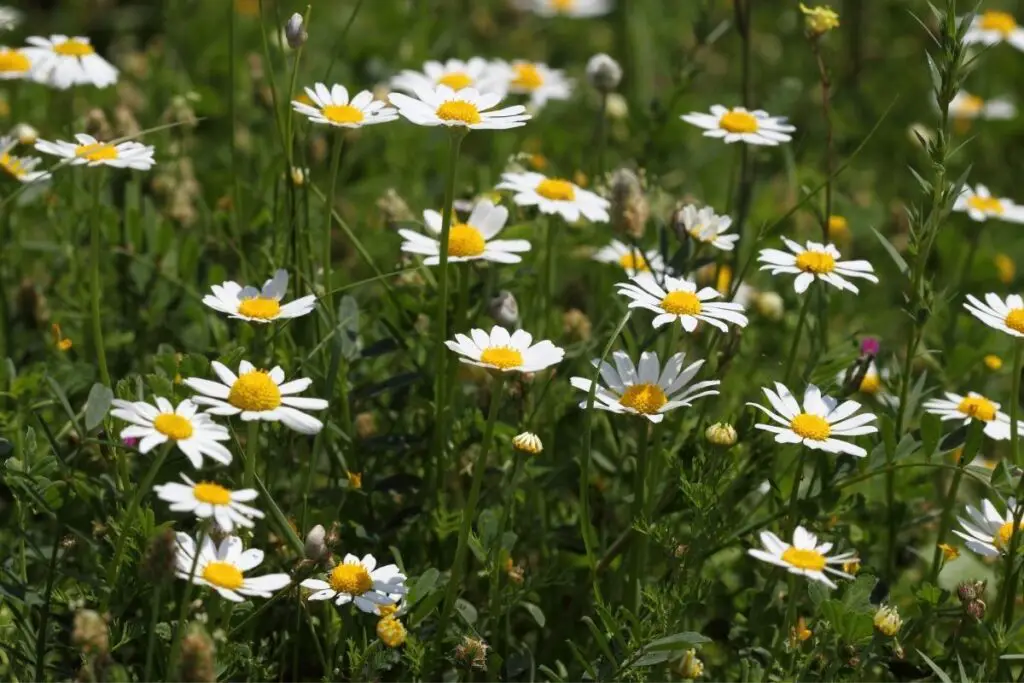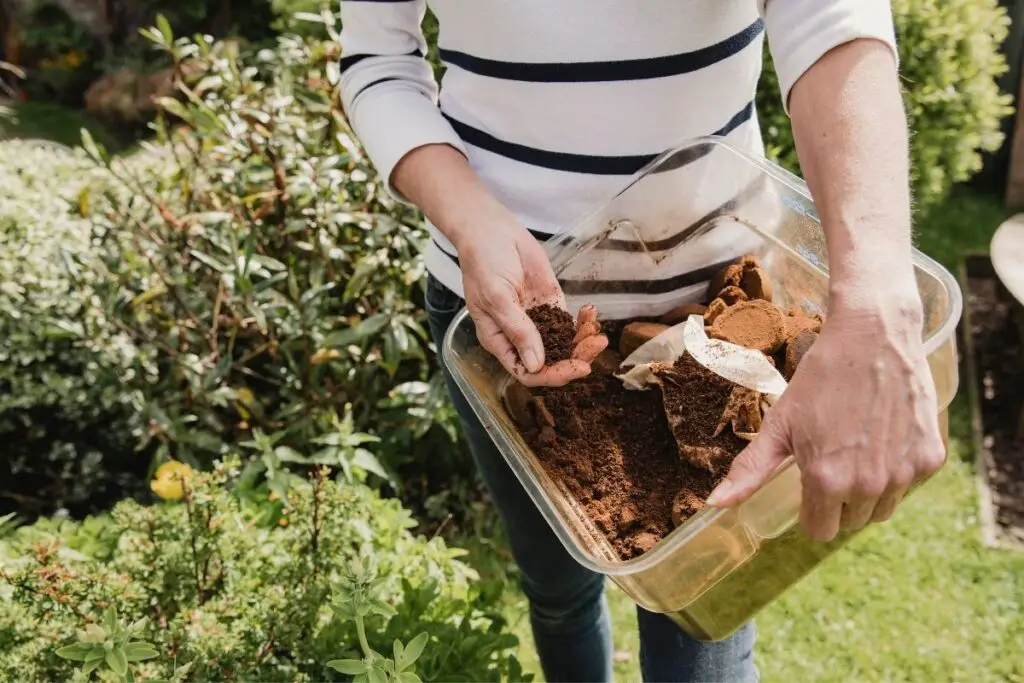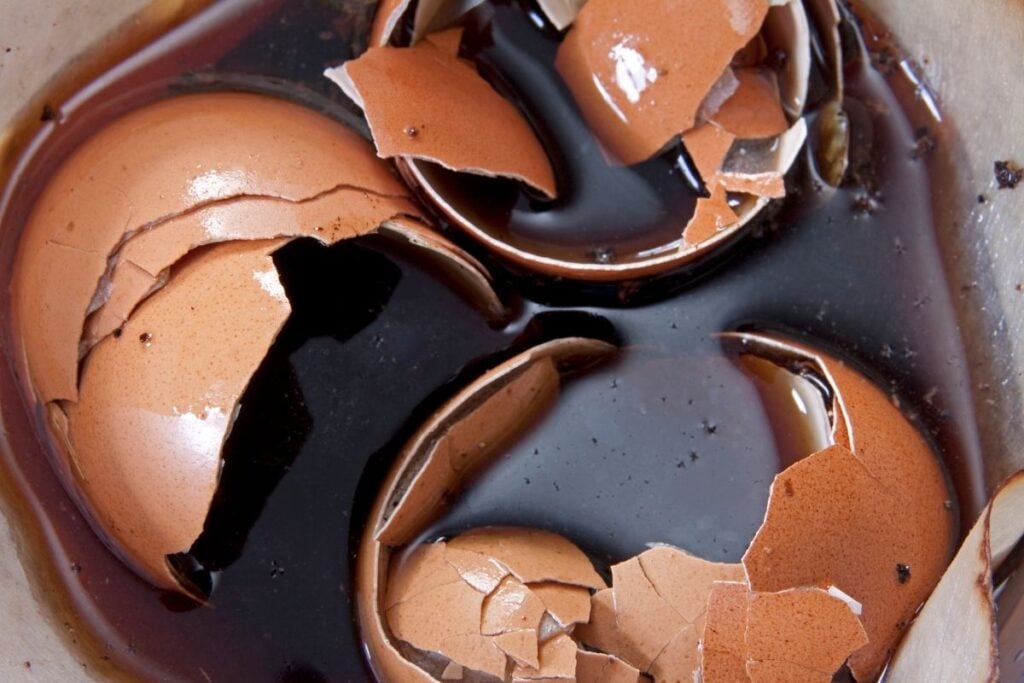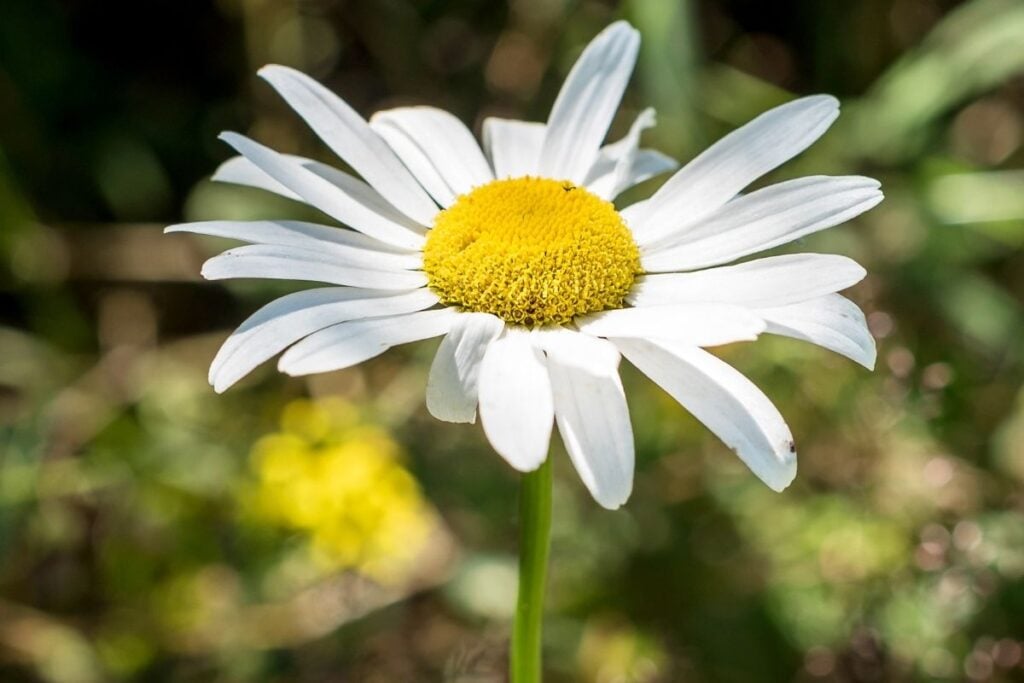Most oMost outdoor gardeners use coffee as supplementary fertilizer for their plants as it is rich in Nitrogen, one of the essential components of plant fertilizers. However, you need to understand whether the daisies like coffee grounds or not. So, in this article, let’s learn if you can put coffee grounds on daisies or not?
Coffee grounds can be beneficial for your daisies if added in moderation in the form of liquid tea fertilizer or compost. However, excess application of coffee grounds can increase the soil’s acidity, which can harm your daisies. It can result in root burn and stunted growth of the plant.
We will discuss the different techniques, hazards, and risks of using coffee grounds on daisies.

Are coffee grounds good for daisies?
Coffee grounds have a high amount of nitrogen, which is one of the important components of plant fertilizers that help the plants grow.
Apart from nitrogen, coffee grounds do not help in adding any other nutrients to the soil.
The daisies prefer neutral soil with a pH value between 6 to 8 on the pH scale. If added moderately to the soil, coffee grounds can maintain this pH value and help the plant develop.
Over a period, the soil can become acidic naturally. In that case, you will need to be aware and avoid applying coffee grounds in the soil. It will make the soil acidic and can be harmful to your daisies.
The correct pH value for the daisies is between 6 to 8 on the pH scale. Since daisies are sturdy plants, they can manage with neutral soil too. But in case the pH is lower than 6, you might notice some problems in your plant.
After brewing the coffee, its pH value becomes 5.2-6.9. This can depend on the coffee ground type. Due to this reason, awareness is required while adding coffee grounds to the soil of your daisies.
How often should I put coffee grounds on my daisies?
Coffee grounds are known for boosting growth in plants. Using coffee grounds on the soil will enhance the growth of the daisies, but you need to remember that you should not do it frequently.
You must feed coffee grounds to your daisies once a month, depending on how the plants are responding.
Always use diluted coffee grounds without adding anything. Make sure that it is not hot; it should instead be at room temperature while you add it to the soil to not shock the roots of the daisies.
If you use it as liquid fertilizer or compost, it will be the best way.
Best ways to use coffee on daisies
Don’t add coffee grounds directly to the daisies as it can be harmful to the plant. It can create a layer of mulch on the soil, which might not be required for the plant.
The mulch can lock excessive moisture in the soil, which can harm the roots and cause root rot.
You can mix the coffee grounds in a good draining soil mix to stop excess moisture accumulation.
We will now discuss different ways of using coffee grounds on daisies.
Looking for gardening supplies? We have tested 100's of products before recommending them to you guys. Check out our best pick below:
| Image | Gardening Supplies | Best Price? |
|---|---|---|
 Top
Top Top
Top | Raised Garden Bed Kit | Check On Amazon |
 | XLUX Soil Moisture Meter, Plant Water Monitor, Soil Hygrometer Sensor for Gardening, Farming, Indoor and Outdoor Plants, No Batteries Required | No Results |
 Top
Top Top
Top | 82 Pcs Garden Tools Set and Extra Succulent Tools Set | Check On Amazon |
 | Joeys Garden Expandable Garden Hose with 8 Function Hose Nozzle, Lightweight Anti-Kink Flexible Garden Hoses, Extra Strength Fabric with Double Latex Core, (50 FT, Black) | No Results |
 Top
Top Top
Top | Dual Chamber Compost Tumbler | Check On Amazon |
 Top
Top Top
Top | Sunnyglade Plant Stakes | Check On Amazon |
 Top
Top Top
Top | Organic Cold Pressed Neem Seed Oil | Check On Amazon |
 Top
Top Top
Top | Mighty Mint Gallon :-Insect and Pest Control Peppermint Oil | Check On Amazon |
 Top
Top Top
Top | Scotts DiseaseEx Lawn Fungicide | Check On Amazon |
 Top
Top Top
Top | Jacks Classic 20-20-20 All Purpose Fertilizer | Check On Amazon |
 Top
Top Top
Top | 30,000 Seeds Pollinator Attracting Wildflower Mixture | Check On Amazon |
 Top
Top Top
Top | Survival Vegetable Seeds Garden Kit-Over 16,000 Seeds | Check On Amazon |
Compost

You can add coffee grounds to the compost because it is rich in nitrogen. It can boost up the plant’s growth.
You should also add other minerals to the compost like phosphorus and potassium so that the plant is not deprived of other nutrients.
Add 15-20% coffee grounds to your kitchen or garden waste to make nutrient-rich compost. Using this will speed up the growth of your daisies.
Always be mindful that you should not use excess coffee that can increase the soil’s acidity.
You can add the compost, prepared with coffee grounds, to your daisies every two months and observe how the plants respond. If you see improvement in their growth, you can continue with the same routine.
You need to take care of the following things while adding coffee grounds to the compost:
- Add dried leaves, barks, and sticks to create a balance of all the nutrients.
- Keep the compost light and dry.
- If you are thinking of transplanting your daisies, mix compost with the soil where before you plant it again.
- Don’t use too much compost as that can be harmful to the daisies.
- Don’t overwater your daisies as the compost will retain water.
Liquid fertilizer

We discussed earlier that using coffee grounds directly on the soil of your daisies is not a great idea, and therefore you can prepare a water-soluble fertilizer out of it.
It is easy to make liquid fertilizer; all you need is a jar. Add water and put the coffee grounds inside it. Leave this aside for at least a week.
After a week, the coffee grounds will break down due to which the nutrients will dissolve in water. Then you can strain that water and use it on your daisies.
But you don’t want to do it too often because it can burn the plant.
Wait for a few days after applying the fertilizer and check how the plant responds to proceed further with the liquid fertilizer. If the plant responds well, you can continue with it occasionally.
The plant might not respond well if there is any issue regarding the coffee grounds. If you notice anything as such, it is best to check for problems which are mentioned below.
The adverse effect of coffee on daisies
There can be many adverse effects of using coffee, making it a bit risky to use. It can make the soil acidic, and daisies will not like very acidic soil.
It is as risky as under-fertilizing the plant because it will show similar symptoms. So, it is necessary to check the pH value of the soil if the plant is not responding well and showing problems.
Below are the signs that your daisies are not liking the coffee.
Stunted growth
Inadequate fertilizers can stunt the growth of the daisies. If the daisies do not get sufficient fertilizers, their growth will slow down due to a lack of nutrients.
When the soil’s pH level increases more than what is adequate for the plant, the daisies might show stunted growth as a symptom.
Frequent use of coffee grounds will prevent the growth in your daisies.
If you can monitor the pH value of the soil, you will understand the reason for stunted growth early enough.
Yellowing leaves
If the leaves of your daisies are getting yellow, it is a sign that the soil’s acidity has increased. Daisies don’t like too much acidity in the soil.
The correct pH level for the daisies should be between 6 and 8.
Check for the soil’s pH level if the leaves of daisies are yellowing and appearing dull.
You must be careful when you use coffee grounds, you should always be aware of the pH level frequently to ensure that the soil doesn’t get too acidic.
Moisture retention
Coffee grounds can hold moisture in the soil for a long time by mulching the soil. The mulch can prevent water evaporation and thus, retain that moisture.
Therefore, the soil needs to be sandy enough to drain extra moisture within a quick time.
Moisture retention in the soil creates a breeding ground for fungus, and due to this reason, root rot can happen.
Attracts pests

If you add the coffee grounds directly to the soil, it can attract pests. Pests can weaken the daisies if not treated on time. A severe pest infestation can be deadly for plants.
So, instead of using coffee grounds directly, you should use them as compost.
How to correct soil acidity?
If the daisies face issues due to soil acidity, you will need to take care of this problem and adopt the below methods to deal with this issue.
- You will need to transplant the daisies with a fresh and well-draining soil so that the water seeps through easily.
- You must check the pH level of the soil frequently to ensure that it is not too acidic for the plant.
- It will help if you choose a bright and sunny spot in your garden to plant your daisies to make sure the extra moisture can dry up.
- If there is no space in your garden to transplant your daisies, you must reduce the acidity of the soil with alkaline water drops.
Final Words
Adding diluted coffee grounds once in a while is the ideal way of using it on your daisies. Avoid using this too often as it can bring in different problems for your daisies.
Instead of using coffee grounds directly, you should use liquid fertilizer and compost for the proper growth of your plants.
Consider transplanting your daisies once every 2-3 years or add alkaline water to the soil. This will prevent the soil from going too acidic.
Also read: Do Daisies Need Fertilizer?
Ref: Wikipedia, Britannica, University Of Florida, Ucanr.edu

What about using coffee grounds on Gerber Daisies?
Hello Mary,
Coffee grounds can be used as a fertilizer for Gerbera daisies due to their nitrogen content. However, use them sparingly and preferably in composted form to avoid potential issues with acidity and to ensure they are broken down enough for the plants to use the nutrients. It’s also important to mix them well into the soil or compost to prevent mold growth. Always monitor your plants’ response and adjust your care routine accordingly.
Hope it was helpful!